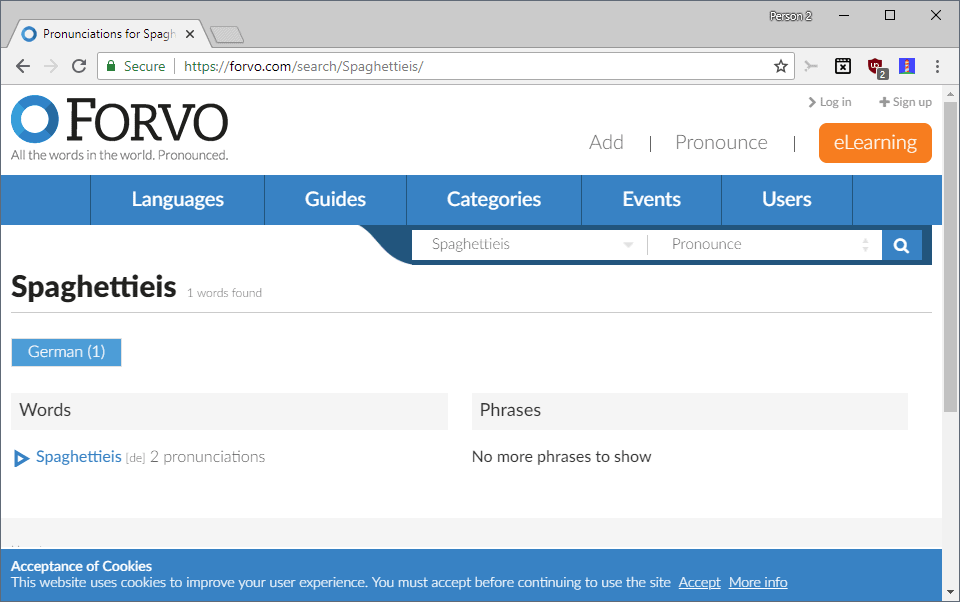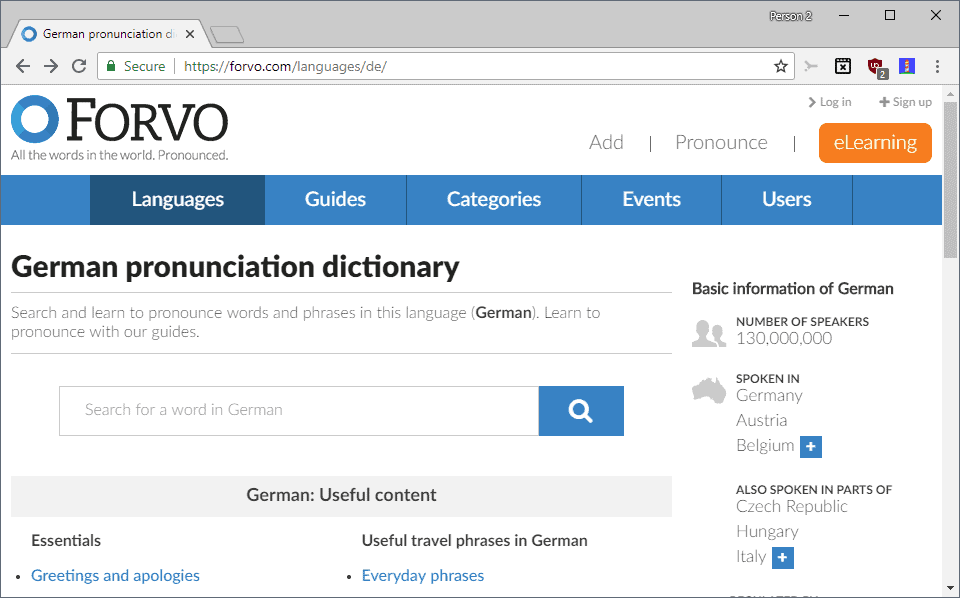Forvo tells you how words are pronounced

Forvo is a free online service that helps you find out how words are pronounced in any of the 330+ languages the service supports.
Forvo is a community-powered website that brings together people from all over the world who use the site to learn how to pronounce certain words or phrases, and provide it with new native language pronunciations.
The site claims that it maintains the largest online pronunciation database with over 4 million pronounced words in over 330 different languages.
Side Note: The top five languages in regards to the size of the database may surprise users: German, Tatar, Russian, English and Japanese. You do find large databases for popular languages such as Chinese, Italian, Spanish, French, or Portuguese as well on the site.
Tip: Find out if you should use Memrise or Duolingo to learn new languages.
Forvo: pronunciation database
If you just want to know how something is pronounced you simply type the word or phrase in the search form on the start page and activate the search button to have results returned to you.
The search results page lists languages the word is known in as well as available pronunciations and, if available, phrases the word or phrase is used in. You may also get translations, a map view, and options to provide your own pronunciation, request a better one, or suggest modifications to add languages, add categories, or report errors.
You hear the recording of native speakers when you click on the play button and logged in users may cast votes (good or bad), share it, and even download it as a mp3 to the local system.
You may explore languages on Forvo to find out more about the language system, get the list of the most popular pronunciations, or explore words based on categories such as traveling, body, greetings and apologies, or colors and numbers.

The category pages list popular and important words and phrases. If you select Everyday Phrases for example, phrases such as "Where are we meeting", "Do you speak English", or "What's Up" are listed, the foreign language translation, and an option to play a sound file to listen to native speakers pronouncing it.
Users who like the service can check out words pending pronunciations to improve it further. An account is needed to provide pronunciations but the recording tools needed are available on-site.
Closing Words
Forvo is a great web service that helps anyone who speaks a foreign language or wants to learn a foreign language improve pronunciation. The reliance on native speakers, and not machine learning and algorithms, ensures that you get accurate "real-life" pronunciations whenever you use the service.
You don't need an account to listen to pronunciations on the site; that is great. Forvo can be a great asset for anyone who speaks a foreign language and is not yet fluent in it, or is just curious about other languages.
Now You: how do you learn new languages?

























Very cool and Thank You for the article Martin!
pretty cool
So cool I made a bookmarklet :p
javascript:(function(){q=document.getSelection().toString().trim();window.open(“https://forvo.com/search/”+q+”/”)})();
If I go to https://forvo.com/word/aluminum/#en from my US location, I only get the US or Canada pronunciation of ‘aluminium’. Is there a way to hear the Great Britain pronunciation using Forvo?
Try: https://forvo.com/user/cbjones82/pronounced-words/page-2/ You’ll find “aluminium” in the list.
If you have a similar problem with differences between US and British English, go to the English language list and then look for pronunciations with “United Kingdom speaker” in brackets after the word or phrase.
The UK spelling is ‘aluminium’ so https://forvo.com/word/aluminium/#en works well.
@chesscanoe Good point. I do prefer the British English spelling of some words but aluminium is not one of them. I also prefer the British English punctuation rules over some of the American English rules. But then, I sometimes can’t help but think that the Brit pronunciation of aluminum and schedule just sounds pretentious. If I prefer humour over humor am I being pretentious? Damn it! ;)
The Cambridge Dictionary does a good job of providing audio for the British English pronunciation of words.
“https://dictionary.cambridge.org/us/dictionary/essential-british-english/”
It’s noted ‘English’ so I assume it’s UK English …
https://forvo.com/search/aluminium/en/
“community-powered website” sounds sympathetic. However, it’s owned by a Spanish media company. I assume that’s not a charity but wants to make money for its owners/shareholders.
“We use third-party cookies for web analytics and display advertising.
The services we use are Google Analytics (use of cookies by google analytics), and Google Adsense.”
Nothing is perfect, profit is not a sin as long as the service is secure and not insidiously tracking its users. Blocking Google Analytics system-wide and 3rd-party cookies on the browser does the job.
But I do understand the gap you point out between what we may conceive of a “community-powered website†and the fact this very website uses GAnalytics and 3rd-party cookies. As far as I’m concerned I’ve lost all my illusions about web communities since a long time; in fact I forget, on the Web but also in all forms of communication, the wording to concentrate on the facts. No illusion, no desillusion, and sometimes good surprises.
Well, I guess they have to pay for the site and its upkeep somehow in the same way that Ghacks does.
But all Google related services can be blocked using a variety of third party addons such as Privacy Badger for example if you feel so inclined ;)
I have listened to a few of main one native tong words but not only there were a few in other country living people who were pronouncing main native tong on a way that I could clearly hear there one country language influenced language pronunciations in main native language.
Next to that also in main one native-born language, there are many also quit hearable spoken text by people who were integrated (original born in other countries) trying to speak in main native-born country langue as correct as they possibly can but still I had to listen quite intense to understand what they were saying.
So still a long way to go.
One more time, thank you Martin !
By the way, what is the pronounciation of ghacks ?
I don’t care about “To be or not to be”, but I really do about the pronunciation of our brother Martin ‘site.
I think “ghacks” should be pronounced as “facks”. How on earth can “gh” be pronounced as “f” you may well ask?
Read this article to see why: https://www.englishclub.com/esl-articles/199909.htm
roughacks gets gh pronounced a ‘f’, I agree. But ghacks ain’t rough (besides a comment once in a while) is it?!
Nice finding, TeIV.
Now that you mention it, indeed : G like George or G like geek when pronouncing ghacks?
Martin, it’s all up to you!
I heard lots of pronunciations for the site over the years. I split the name into G and then Hacks.
If split then I’d consider G like Geek rather than G like George …
Oh that’s handy! I often come across words or phrases in French which I have no idea how to pronounce such as “raison d’être” which I came across this morning in a Guardian article concerning Brexit.
rezon de tre
When it comes to Spanish, English, German, French, Portuguese and Italian vocabulary but also wordings and mainly more complex ones, wordreference.com is a place of choice even including a forum where tailored translations are discussed. I refer to it regularly as well as to deepl.com when it comes to translating full sentences/paragraphs (rather than Google Translations which I use only for languages not managed by deepl.com).
Than You Sir! Appreciate the links!
I tried the phrase on deepl.com to translate into English, but it just repeated it without providing the translation.
Wordreference.com provides an explanation, but there doesn’t appear to be a spoken pronunciation anywhere of that particular phrase. In that respect, I can usually figure out what a word or phrase in another language means by the context in which it’s used, but Forvo is handy to actually pronounce it.
“Do you speak American?” :=)
Thanks for the article, Martin. Several translation dictionaries offer the audio pronunciation but not as widely as Forvo. Bookmarked.
I speak Can-EH!-dian :-P
@pHROZEN gHOST, and the Canadian accent is specific. Many foreigners don’t make the difference with the American accent but there is one. In fact many French (French at least) who’ve lived in the States young and long enough to “catch” the American accent have in fact the Canadian accent, maybe due to the melting with French vocals, no idea. This Canadian accent is sometimes also mistaken with American “preppy” accent. Time to watch again “My Fair lady” and the marvelous accents of different blocks within London itself. I love accents, the charm of a language as the sauce is to spaghetti (as I always say!). I’ve been told I had that Canadian accent when speaking in English (and I’ve never been a preppy!).